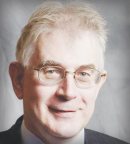The results of monarchE were discussed by George W. Sledge, Jr, MD, Professor of Medicine and Chief of Oncology at Stanford University Medical Center, who offered some possibilities as to why its results were positive and those for palbociclib, in the phase III PALLAS trial, were “resoundingly negative.” Dr. Sledge also posed some questions for consideration as future research builds upon these data.
The improvement in disease-free and distant metastasis–free survival with abemaciclib in monarchE, he said, “establishes, for the first time, a proof of concept for CDK inhibition in the adjuvant setting, and, as such, is important. This is the first improvement we’ve seen over aromatase inhibitor therapy.”

George W. Sledge, Jr, MD
However, although monarchE was clearly positive, Dr. Sledge said the current analysis suffers from a too-short follow-up (15.5 months), with few patients having received the full 2 years of therapy. “This is a very early presentation of the data, and indeed, some might argue premature,” he said.
“As a breast cancer doctor who treats a lot of patients with estrogen receptor–positive breast cancer, I am well aware of the fact that roughly half or more of patients who eventually relapse and die will do so after 5 years, so 15.5 months is clearly not long enough to estimate the overall impact of abemaciclib,” according to Dr. Sledge.
“And although no new side effects were reported,” he continued, “abemaciclib clearly adds toxicity to adjuvant endocrine therapy, including important—albeit rare—cases of interstitial lung disease and venous thromboembolism complications. That said, this is a positive trial. The addition of abemaciclib to adjuvant endocrine therapy improves invasive disease–free survival by 3.5% and distant recurrence–free survival by 3.3% at the 2-year mark. The results have respectable hazard ratios that are quite statistically significant,” he noted.
A Tale of Two Trials
“But why did monarchE succeed whereas PALLAS failed?” Dr. Sledge asked. “Putting aside the play of chance in the trial results, there are three major reasons: the hypothesis might be wrong, something in the study design might prevent a successful outcome, or one might simply be working with the wrong drug.”
Since one trial is positive, the hypothesis is not wrong, according to Dr. Sledge, but it is possible that the trial populations were dissimilar enough—that is, monarchE was “clearly weighted” toward a higher-risk population—to result in diverging outcomes. “If this has the effect of generating more events and more early events, this might allow the trial to have a better chance at showing a difference,” he said.
Although their similar success in metastatic disease argues against this—he noted, “there is no convincing evidence that any agent is more efficacious than another”—there may be differences between the drugs, Dr. Sledge continued. Abemaciclib is given continuously and palbociclib, intermittently, and abemaciclib has a relatively greater potency against CDK4 than CDK6. Perhaps these characteristics matter. The greater proportion of drug discontinuations with palbociclib may also have mattered, he added, though with longer treatment exposure to abemaciclib, this discrepancy may disappear. Regardless, he commented, “It’s a certainty that one cannot benefit from a drug that one does not take.”
Unanswered Questions Remain
Dr. Sledge reminded listeners that positive trials raise as many questions as they answer including the following, from monarchE:
- What will be the ultimate increase in disease-free survival and distant recurrence–free survival? Will the curves continue to split, or is the answer already in?
- Will improvements seen in disease-free survival translate into what patients and health-care systems care most about: overall survival? Time will tell.
- Will late recurrences be prevented as well as early recurrences, as shown in the study?
- What is the optimal duration of therapy? Is 2 years more than is needed—or not enough? This is an important question for an expensive drug with real side effects.
- Can we determine who benefits and why the drug is not effective in some patients
- What about the third CDK4/6 inhibitor, ribociclib? The large NATALEE Trio trial is now accruing, and answers from that study are eagerly awaited.
“Finally, these drugs are expensive,” Dr. Sledge emphasized. “A total of 2 years of adjuvant therapy is simply out of reach for the majority of patients around the globe who might be candidates…. The decision to use adjuvant CDK4/6 inhibitors is more complex than a simple perusal of disease-free or distant recurrence–free survival data and will need to be weighed against evolving measures of benefit.”
DISCLOSURE: Dr. Sledge has served in a leadership position for Syndax and Tessa Therapeutics; holds stock or other ownership interests in Pionyr, Syndax, and Tessa Therapeutics; has served as a consultant or advisor to Radius Health, Symphogen, Synaffix, Syndax, Taiho Pharmaceutical, and Verseau Therapeutics; has received institutional research funding from Genentech/Roche and Pfizer; and has been reimbursed for travel, accommodations, or other expenses by Radius Health, Tessa Therapeutics, and Verseau Therapeutics.

